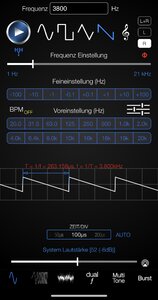Nothing whatsoever suggests Dr. Lim's work will be game changing. There was one (!) positive anecdote posted about it years ago and that's it. Get real.
The fact that he joined Neuromod makes him uninteresting. He cares about money, not about effective treatments. He's a puppet.
I think that Dr. Lim's device curing
@kelpiemsp's 80 dB tinnitus and curing visual snow at the same time and having the effects last for years is significant. He's checked into Tinnitus Talk not that long ago this year saying that the effects of the treatment have lasted.
I've been corresponding with Dr. Lim by email and he claims the work that cured
@kelpiemsp is continuing, and there will be a new trial in a year or two at the University of Minnesota. If the results that
@kelpiemsp felt from the device Dr. Lim developed can be reproduced in others, then yes! That will be game changing. What happened to that individual is very real, indeed.
Dr. Shore's device calms overactivity of the fusiform cells in the DCN, which I think will be effective. However, Dr. Lim's device attacks the auditory thalamus which is a gating mechanism of the brain which regulates hyperactivity in the auditory cortex. So where Dr. Shore's device currently only works on somatic tinnitus, Dr. Lim's device should be effective for both for cases of somatic tinnitus and non-somatic tinnitus.
The status pinned to the top of
@kelpiemsp's profile on Tinnitus Talk is "I am currently experiencing silence for the 1st time in 31 years. No wonder people are so upset. What a strange and nice feeling." I believe that. You can believe what you want.
Out of curiosity, is the understanding that Dr. Shore's device would not function in cases where the user had habituated to tinnitus, and would only function on relatively "new" cases (< 6 months)?
No, I've had an email exchange with Dr. Shore where I asked if her device will work for those with long lasting tinnitus. She said that there were people in her trial that had had tinnitus for a very long time. However, she didn't go into detail about how long they'd had it.

 Member
Member